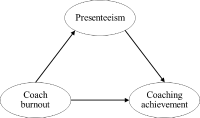PURPOSE This study aims to develop a coach presenteeism scale with scientifically proven reliability and validity. METHODS In order to achieve the research purpose, preliminary questions were drafted using previous studies (Lee & Kim, 2022) and existing presentation questionnaires (SPS-34, SPS-6, SPS-13). The preliminary set of questions was composed of 23 questions, which were deliberated through a meeting with subject experts. After which, a survey involving 183 coaches was conducted. In this study, statistical verification procedures were conducted through construct validation, exploratory factor analysis, confirmatory factor analysis, internal consistency analysis, convergent validation and discriminant validation. RESULTS Finally, a 2-factor (DRA 5 items, DTP 5 items), 10-item coach presenteeism scale was developed. CONCLUSIONS In this study, a scale with verified reliability and validity was developed to support and investigate the presenteeism phenomenon experienced by coaches. These may be used by coaches themselves to check their presenteeism status and may guide future research to effectively train athletes.

Purpose The purpose of this study was to examine the relationship among burnout, presenteeism, and coaching achievement perceived by athlete coaches in the sport field, and to identify the mediating effect of the presenteeism on the relationship between burnout and coaching achievement. Methods For this purpose, data were collected from 151 athlete coaches in South Korea through the survey. Measurement tools consisted of questionnaires on the coach’ burnout and presenteeism (SPS-13) that were designed in line with the research purpose. Collected data were analyzed using reliability testing, descriptive statistics, correlation analysis and simple mediation effect test. Results First, burnout level perceived by coaches was positively related to presenteeism, and not associated with coaching achievement. And presenteeism negatively correlated with coaching achievement. Second, the burnout level of the coach was negatively related to the coaching achievement through the presenteeism, the mediating variable. Conclusions Burnout of the athletes' coaches in the sports field has been confirmed to decrease the coaching achievement by increasing the presentations which is the work impairment due to their health problems.

PURPOSE This study aimed to provide evidence for improving the working environment by exploring the phenomenon of presenteeism experienced by coaches. METHODS Ten coaches experiencing presenteeism were selected as participants of the study using the snowball sampling method, and in-depth interviews were conducted. The in-depth interviews were conducted for about 50 to 60 min using semi-structured questions organized through pre-expert meetings, and inductive content analysis was conducted. RESULTS First, the health problems that developed while coaching were categorized into two detailed areas (physical and psychological symptoms). Second, the causes of presenteeism were categorized into four general areas (policy and institutional problems, poor job environment, athlete problems, and human relations). Third, performance loss due to presenteeism was categorized into two general areas (coach-athlete relationship damage and poor training performance). Finally, coping with presenteeism was categorized into three detailed areas (private time spending, joining acquaintances, and changing training methods). CONCLUSIONS The result of this study confirmed that coaches are currently experiencing the phenomenon of presenteeism for various reasons, and the symptoms and coping method for this differ with each individual. However, the phenomenon of presenteeism experienced by coaches requires further future research since it is not easily observed and the coping method is not efficient.